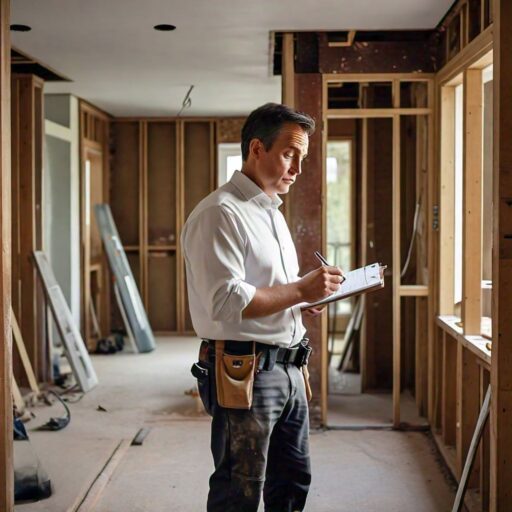Introduction To Vacation or Home Improvement:
Before deciding between vacation or home improvement, it’s essential to understand the importance of home improvement and renovation. Home improvement and renovation are essential for maintaining and enhancing the value, functionality, beauty, and comfort of your home.
When you think about the mess and chaos that come from home improvement or renovation, like the constant noise, dust, disruption everywhere, and your daily routine being turned upside down, then you decide to pack up and take a vacation with family during this time, which becomes very appealing.
This article provides a comprehensive guide to vacation or home improvement. Covering key topics such as the importance of renovation, challenges to expect, benefits of renovating during vacation, contractor selection, pros and cons of all aspects of supervision tasks, pre-vacation preparation, and post-renovation inspection. Get the insights you need to manage both effectively.

1. The Importance of Home Improvement:
Home improvement projects do more than just make your home look better—they’re an investment in your property. Renovations can boost your home’s value and make it more attractive to buyers if you ever decide to sell. Beyond the financial gains, upgrading your home can greatly improve your comfort and how well your space works for you.
Whether these upgrades, like a modernized bathroom, kitchen, living room, bedroom, new roof, or fresh tiles or hardwood flooring, can make a big difference, adding a backyard deck, a home office, or extra storage can also improve your daily life. Plus, fixing leaky faucets or installing new smoke detectors can keep your family safe, making your home happier and more secure.

2. Challenges of Home Renovation:
While the benefits of home improvement are clear, the process of home improvement itself can be challenging. Renovation projects often involve noise, dust, and debris, creating a chaotic environment. Paint fumes and other chemicals used in improvement and renovation can pose health risks, particularly to children and the elderly.
The constant disruption can be stressful, making it difficult to carry on with your routine. For these reasons, some homeowners consider taking a vacation during renovation work to avoid the mess and noise.

3. Why Vacation is the Best Time for Renovation:
Taking a vacation while your home undergoes renovations can be a smart move. Being away allows you to avoid the stress and inconvenience of living in an improvement or renovation zone. This approach requires careful planning, however. Before you leave, select a reliable contractor who can manage the project in your absence.
Ensure you plan the scope of work, agree on pricing, and provide all necessary materials ahead of time. By doing so, you’ll help keep the renovation on track and ensure everything goes smoothly while you’re away.
4. Choosing the Right Contractor:
The success of your home renovation depends on hiring a skilled and experienced contractor. Look for one with a solid track record and positive customer reviews. Before you leave, clearly define the scope of work, agree on pricing, and set a completion timeline.
Make sure your contractor’s team has the necessary skills for the job. Even while you’re on vacation, keep communication open and request regular updates. This ensures your project stays focused and achieves your desired outcome.

Vacation or Home Improvement: Pros and Cons:
We’re here to help you decide between a vacation or home improvement. To make it easy, we’re breaking it down into two simple options: Supervise your home improvement project yourself or let supervise and manage a contractor, and then you relax on vacation. We’ll show you the pros and cons of each.
5. Supervise Home Improvement Project Yourself:
| Pros | Cons |
| Direct Oversight: Ensure the work meets your specifications. | Stress and Disruption: Deal with ongoing noise, dust, and construction disruption. |
| Immediate Problem Resolution: Address any issues as they occur. | Clear Communication: Directly communicate with a contractor for changes or updates. |
| Quality Control: Maintain high standards for craftsmanship and materials. | Decision Fatigue: Constantly make decisions, which can be overwhelming. |
| Clear Communication: Directly communicate with the contractor for changes or updates. | Limited Productivity: Time spent supervising might limit your ability to focus on other tasks. |
| Personal Involvement: Make real-time decisions about design and execution. | Physical Presence Required: You need to be physically present for inspections and meetings. |
| Detailed Monitoring: Ensure all aspects of the project are completed as planned. | Potential for Conflict: Possible disagreements with contractors over details or changes. |
| Avoid Misunderstandings: Reduce the risk of miscommunication. | Monitoring Complexity: Keeping track of multiple aspects of the project can be challenging. |
| Customization: Adapt the project based on real-time feedback. | Increased Pressure: Responsibility for project success rests heavily on you. |
| Security: Monitor for any security issues or risks. | Emotional Stress: Manage potential conflicts or issues that arise. |
| Personal Satisfaction: Experience the project’s progress firsthand. | Interruptions to Routine: Daily life and routines may be interrupted by construction activities. |

6. Supervise and Manage by a Contractor:
| Pros | Cons |
| Escape Disruption: Avoid the stress and noise of renovation. | Trust Issues: Relying entirely on the contractor can be risky if they are not reliable. |
| Relaxation: Enjoy a vacation without construction distractions. | Communication Gaps: Risk of Missing Important Decisions or Changes. |
| Project Completion: Return to a finished or near-finished project. | Potential Mistakes: The risk of mistakes or issues going unnoticed until you return. |
| Reduced Stress: Eliminate daily interruptions and pressure. | Quality Control: Less direct oversight of the quality and accuracy of your renovations. |
| Focused Work: Allow contractors to work efficiently without constant oversight. | Unseen Issues: Problems may arise that you won’t be aware of until you return. |
| Professional Management: Rely on the contractor’s expertise. | Quality Control: Less direct oversight of the quality and accuracy of your renovations. |
| Opportunity for Contractor Growth: Contractors manage the project in their preferred manner. | Quality Control: Less direct oversight of the quality and accuracy of your renovations. |
| Peace of Mind: Trust the contractor to handle the project professionally. | Unexpected Delays: Potential for delays or issues affecting the timeline. |
| Time Management: Use your time away for relaxation or other activities. | Limited Input: Less ability to make changes based on real-time progress. |
| Minimal Daily Contact: Less need for frequent decisions or adjustments. | Post-Return Adjustments: You may need to address issues or make adjustments after returning. |

7. Balancing Vacation and Home Improvement:
If you’re deciding between going on vacation or staying home during renovations, you can manage both. Coordinate with your contractor to handle the renovation while you’re away. Make video calls, use camera supervision and messaging to stay updated, and make decisions remotely.
Make sure you have a backup plan for any unexpected issues, and set up regular check-ins to keep everything on track, even if you’re not physically present.
8. Renovation Checklist Before Leaving on Vacation:
Before you go on vacation, make sure to finalize all the details and renovation checklist with your contractor. Create a clear agreement that outlines the scope of work, measurements, pricing, and completion timeline. Keep one copy for yourself and give one to the contractor.
Take photos of the areas to be renovated before work begins, so you can compare the results with the “before and after” shots. Have a checklist ready, and ensure you have all important documents and contact information. Set up a communication plan for regular updates while you’re away.
9. Importance of Post-Renovation Inspection:
Once the renovation is complete, do a thorough inspection to ensure everything meets your expectations and resolve any issues before final payments. Review the agreement, scope of work, and timelines to confirm all aspects are completed as agreed upon.
Also, consider holding back a portion of the payment (e.g., 10–20%) for three to four months after completing major work like construction, plumbing, or roofing, to ensure quality and satisfaction.
This allows time to check for any issues or defects, and if the work is satisfactory and no problems arise during this period, you can release the final payment to the contractor.

10. Practical Tips for Vacation or Home Improvement:
A. If the owner chooses to vacation:
1. Plan and book a relaxing getaway: Choose a destination that allows you to unwind and forget about the renovation stress.
2. Set clear expectations with your contractor: Establish a communication plan, define project milestones, and ensure you’re accessible for questions or concerns.
3. Prepare for unexpected delays or issues: Leave a contact person for the contractor, and have a contingency plan for unexpected expenses or changes.
B. If the owner chooses to supervise:
1. Establish a clear project schedule and timeline: Break down tasks, set deadlines, and ensure all parties are on the same page.
2. Communicate effectively with your contractor and workers: Be approachable, ask questions, and clarify doubts to avoid misunderstandings.
3. Set a realistic budget and stick to it: Establish a contingency fund, prioritize spending, and avoid costly changes or upgrades.
4. Keep a record of progress and issues: Document everything, including photos, notes, and correspondence, to track progress and resolve disputes.
5. Be prepared to make decisions quickly: Renovations can be unpredictable; stay flexible and make informed decisions when unexpected issues arise.
6. Insist on quality products and materials: Research, compare, and select materials that balance cost, durability, and aesthetics to ensure a long-lasting and satisfying result.
7. Take care of yourself: Supervising a renovation can be stressful; maintain a healthy work-life balance and take breaks when needed.
Conclusion:
In conclusion, deciding whether to stay home or take a vacation during home renovations is a personal choice that depends on your circumstances. This article on vacation or home improvement helps you make an informed decision by weighing the pros and cons carefully to determine what works best for you.
If you choose to take a vacation, proper planning and selecting the right contractor are key to ensuring a smooth renovation process. If you decide to stay, be prepared for the challenges that come with supervising the work personally. Either way, home improvement is a valuable investment that, when done right, can significantly enhance your living space and increase your property’s value.
FAQs:
1. Should I stay home or take a vacation during renovations?
It depends on your personal circumstances, budget, and preferences. Consider factors like the scope of work, duration, and your tolerance for chaos.
2. What are the benefits of taking a vacation during renovations?
Taking a vacation can help you avoid stress, chaos, and health hazards like dust and noise pollution. It also ensures a smooth renovation process without interruptions.
3. How do I choose the right contractor for my renovation?
Research local contractors, ask for referrals, check licenses and insurance, compare bids, and verify references to find a reliable and skilled professional.
4. What is the importance of proper planning in home renovations?
Proper planning ensures a smooth process, avoids delays, stays within budget, and helps you achieve your desired outcome. “It requires defining clear objectives, deadlines, and financial plans.
5. Can I supervise the renovation work myself?
Yes, but be prepared for challenges like managing contractors, handling unexpected issues, and maintaining a safe working environment. It’s crucial to have a clear understanding of the project’s scope and timeline.
6. What are the health hazards of living in a renovation zone?
Health hazards include dust, noise, mold, chemical exposure, and structural instability. Take necessary precautions, like wearing protective gear, sealing off areas, and ensuring proper ventilation.
7. Can I stay in a portion of my home during renovations?
Yes, if it’s safe and separate from the construction area. Ensure that utilities, ventilation, and emergency exits are accessible and functioning.
8. What are the benefits of home improvement?
Home improvement increases property value, enhances living space, improves quality of life, and boosts your mental and physical well-being.
9. Can I make changes to the renovation plan mid-project?
Yes, but it may cause delays, and additional costs, and impact the overall outcome. Communicate changes clearly with your contractor and adjust the plan accordingly.
10. How do I handle unexpected issues during renovations?
Stay calm, communicate with your contractor, assess the situation, and find solutions together. Prioritize safety, and be prepared for delays or budget adjustments if necessary.

